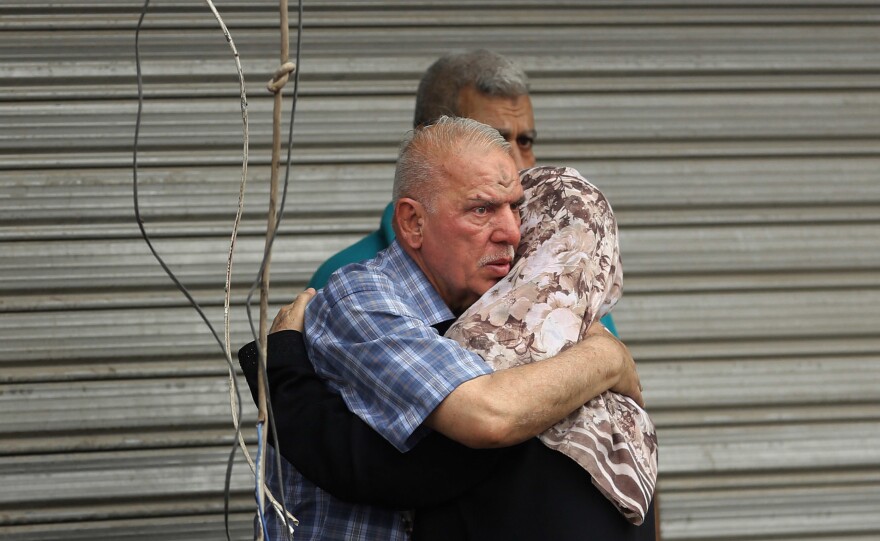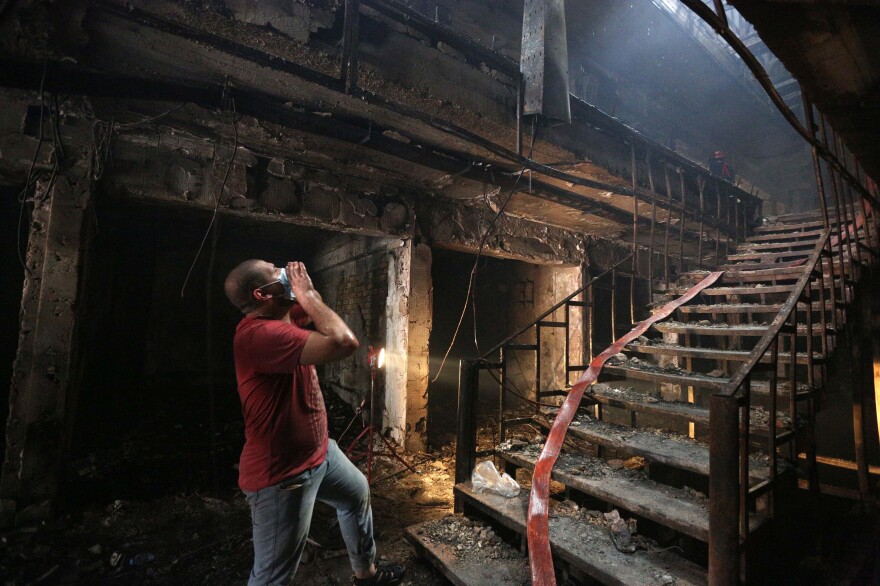Updated 4:30 a.m. ET with new death toll
A bomb struck a busy street in Iraq's capital Baghdad, killing at least 142 people.
It exploded in the Karada neighborhood very early on Sunday, "where people were gathering to shop, socialize and watch soccer during a hot, lively Ramadan night," as NPR's Alice Fordham tells our Newscast unit. She adds that many people were sitting in sidewalk cafes where they had been watching a European soccer match.
Images from the scene show multiple charred buildings, burned-out cars and twisted metal. Civilians and rescue workers search for survivors and carry out bodies as family members of the missing wait for news.

At dawn on Sunday, hours after the attack, firefighters were "still working to extinguish the blazes and bodies were still being recovered from charred buildings," The Associated Press reports. It adds that many of those killed are children.
The so-called Islamic State claimed responsibility for the attack in an online statement, though NPR was not able to independently verify the claim.
Iraqi Prime Minister Haidar al-Abadi has announced three days of mourning.
He visited the site of the bombing Sunday, where angry residents pelted him "with shoes, water bottles and lumps of rock," as Alice reports. Video circulating on social media appears to show angry crowds and the prime minister's hastily-departing convoy.
A video posted by al-Abadi on Facebook shows the tense-looking prime minister moving through the crowd surrounded by security personnel, amid screaming and racing ambulances.
This bombing comes a week after Iraqi forces said they wrested control of the city of Fallujah from ISIS fighters. Fallujah is just 35 miles from Baghdad, and the extremist organization used it as a staging ground to mount attacks on the capital.
The angry reception that residents gave al-Abadi, Alice tells Weekend Edition Sunday, "shows us that although he has had a spike in popularity after victories such as the one in Fallujah, by being unable to control the security in Baghdad, the prime minister still finds himself in a vulnerable position.
Alice explains that "in a way, these attacks are more likely" after ISIS has lost territory. When ISIS was at its peak strength in Iraq, it controlled about a third of the country. She adds:

"In a surreal kind of way, because the extremists were busy administering territory, their insurgent tactics actually kind of dropped off. Strangely, Baghdad, which was controlled by the government, actually became a lot safer. Now as there have been these victories against ISIS by the Iraqi security forces and their allies, ISIS is no longer administering territory in the same way. But that does mean we have seen these insurgent tactics rear their head again."
The White House has released a statement condemning the attack. "These attacks only strengthen our resolve to support Iraqi security forces as they continue to take back territory from ISIL, just as we continue to intensify our efforts to root out ISIL's terrorist network and leaders," it reads.
Copyright 2020 NPR. To see more, visit https://www.npr.org. 9(MDA3MzEzNjc2MDEzMDI2Mzc4OTc4NTFmNg001))



